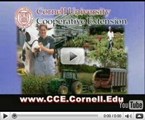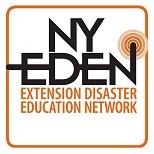Posted 9/17/2010
by Craig Clark

The United States Department of Agriculture is looking for help identifying areas infested with tree damaging pests. The Emerald Ash Borer (EAB) and the Asian Longhorn Beetle (ALB) have destroyed millions of trees in the United States. The EAB has been confirmed in several New York counties this summer (Steuben, Monroe, Livingston, Genesee, Greene and Ulster counties, plus Cattaragus last summer).
The USDA says you can help stop the spread of the Emerald Ash Borer and the Asian Longhorn Beetle by checking your neighborhood for signs of these invasive bugs.
For more information on how to identify infestation read the USDA’s fact sheets on Emerald Ash Borers and the Asian Longhorn Beetle.
If you do spot these bugs or signs of infestation, the USDA is asking you report it to the USDA’s State Plant Health Director at USDA-APHIS-PPQ, 500 New Karner Road, 2nd Fl., Albany, NY 12205, phone: (518) 218-7510 or by e-mail at Yvonne.M.DeMarino@aphis.usda.gov.
Also visit the USDA’s Beetle Detective website where you can find out how to report sightings online.
Photo credit: Howard Russell, Michigan State University, Bugwood.org
Posted 9/17/2010
by Craig Clark

Home heating season is almost here. Are you prepared? Attend Cornell Cooperative Extension’s free energy saving workshop and start taking steps to lower your energy use and save money. Free energy saving tool kits will be distributed.
When: Monday, Sept. 20 at 6 p.m.
Where: Johnstown Public Library, 38 S. Market St., Johnstown
Pre-registration is required. Call 762-3909 x. 104 to sign up.
Save Energy, Save Dollars is a free interactive workshop designed to help consumers cut home utility bills. The workshop covers home heating, air sealing, hot water, appliance use and lighting. Free energy saving tool kits are distributed to each participating household.
Posted 9/15/2010
by Craig Clark

Nearly 80,000 books in the Cornell Library have been digitized and are now available online to anyone for free.
All the books are in the public domain and were mainly printed before 1923 in the United States. Subject areas include American history, English literature, astronomy, food and wine, general engineering, the history of science, home economics, hospitality and travel, human sexuality, labor relations, Native Americans, ornithology, veterinary medicine and women's studies.
A quick search turns up familiar titles such as the poems of Longfellow, Moby Dick and Mark Twain classics. Many books of local interest are also available such as The History of Montgomery and Fulton Counties, NY (1878), Horace Sprague’s Amsterdam: a poem, and a copy of the first edition of the Mohawk Valley Cookbook published by St. Mark’s Lutheran Church in Canajoharie in 1889.
The Cornell Library books were digitized thanks to a partnership with Microsoft and Kirtas Technologies and made available online through the nonprofit Internet Archive.
To search for title you may be interested in visit the Cornell University Library page on InternetArchive.org.
The books are available for viewing online and in downloadable PDF formats and available for Kindles as well.
Posted 9/11/2010
by Jessica Chittenden Ziehm

New York State Agriculture Commissioner Patrick Hooker has alerted consumers that Midland Farms, located in Menands, New York, is voluntarily recalling certain milk products due to the potential of improper pasteurization. Proper pasteurization heats milk in order to effectively eliminate all pathogenic bacteria, such as Listeria and Salmonella.
The recalled milk products are all sold in plastic containers and are marketed under the brand names Midland Farms, Corrado’s Market, Jersey Dairy Farms and Trade Fair Premium. They all possess the plant code 36-1661. The products also possess a black ink date code near the top of the container. The recalled products were sold in New York, Connecticut, Massachusetts, New Jersey and Rhode Island.
Posted 9/10/2010
by Craig Clark
A Cornell University entomology professor and a former Cornell student discuss bed bugs in the below CornellCast video. This six minute video explains how to spot bed bug infestation and what to do if you discover you have them.
To learn more about bed bugs read Cornell’s Insect Diagnostic Laboratory’s fact sheet on bed bugs. The New York State Integrated Pest Management Program also has available Guidelines for Prevention and Management of Bed Bugs in Shelters and Group Living Facilities.
Posted 9/4/2010
by Karen Kosinski
Today is "Step UP to Health Day" in the Cooperative Extension building at Fonda Fair. If you are headed to the fair to take advantage of this beautifully cool day, do stop by Cooperative Extension and learn something about whole grains. A demonstration at 2 p.m. will let you taste some whole grains and learn how to select, prepare and eat them! Remember to make half of your grains whole grains every day.
Posted 9/3/2010
by Karen Kosinski

Today is "UP with YOUth Day" today in the Cooperative Extension building at Fonda Fair! Discovery Stations 12-3 pm are a great way for school age kids to discover how learning science can be fun. And, check out the science words posted all over the building! At 4pm 4-Hers will present a Fashion Revue. Face Painting from 12-6 pm. 4-H Snack Bar open 11 am-10 pm. Come join us. Lots to see, do & learn - all under cover.
Posted 8/31/2010

CCEFM’s consumer and financial community educator Craig Clark was on the Coffee with Cudmore radio show last week discussing energy used by home appliances.
You can listen to Craig and Bob Cudmore talk about ways to save energy with common household devices such as TVs, computers, electric heaters and more on this WVTL 1570 AM/Lite 104.7 FM podcast.
Local Cornell Cooperative Extension educators and master gardeners are on the air every Wednesday morning at 8:35 a.m. on WVTL/ 104.7 FM.
Tune in this next Wednesday to hear Master Gardener Phyllis Minich discuss watering.
Posted 8/24/2010
by Cornell Chronicle Online

Rolling walkers -- which help senior citizens maintain mobility and an active lifestyle -- have become safer and easier to use.
Cornell biomedical engineering students working with Weill Cornell Medical College-affiliated psychiatrist Dr. Eli Einbinder have designed an electronic braking system for walkers, with buttons replacing bicycle-style squeeze brakes. Their walkers also have automatic braking that can prevent slips, slides and falls when a user grabs the handgrips.
For three years, a team of graduate students from the Department of Biomedical Engineering and undergraduate seniors from several departments in the College of Engineering worked with David Lipson, Cornell professor of engineering, as well as with Einbinder on a prickly problem: how to prevent elderly users with limited mobility from inadvertently falling when they use a braking walker.
Posted 8/17/2010
by Marilyn J. Smith

The U.S. Department of Agriculture announced on August 4th that the 2010 National Farmers Market Directory lists 6,132 operational farmers markets, representing 16 percent growth over 2009 when the agency reported 5,274.
"Seeing such continued strong growth in the number of U.S. farmers markets indicates that regional food systems can provide great economic, social and health benefits to communities across the country," said Vilsack. "Farmers markets provide fresh, local products to communities across the country while offering economic opportunities for many producers of all sizes."
Other findings from the 2010 USDA National Farmers Market Directory include:
STATE STATISTICS - NEW YORK IS NUMBER 2 IN THE NATION FOR THE NUMBER OF MARKETS:
- Top 10 states with the most farmers markets: California (580), New York (461), Illinois (286), Michigan (271), Iowa (229), Massachusetts (227), Ohio (213), Wisconsin (204), Pennsylvania (203) and North Carolina (182); and
- Top 10 states, by percentage, with market growth from 2009-2010: Missouri (77), Minnesota (61), Idaho (60), Michigan (60), Indiana (47), South Dakota (46), Arkansas (41), Washington (37), Ohio (36) and Oklahoma (31).
OFF SEASON OPERATIONS - INCLUDES THE MOHAWK VALLEY MARKETS PRODUCED BY THE MONTGOMERY COUNTY AG ECONOMIC DEVELOPMENT PROJECT AND CORNELL COOPERATIVE EXTENSION IN FULTON & MONTGOMERY COUNTIES.
- 886 farmers markets are open for operation in the off-season (between November-March); and
- Off-season farmers markets operate in 47 states and the District of Columbia.
The USDA National Farmers Market Directory can be found at http://farmersmarkets.usda.gov. Farmers markets can be searched by state, county, zip code and participation in federal nutrition assistance programs.
Results from the USDA National Farmers Market Directory are based on voluntary reporting from farmer’s market managers. In 2010, USDA collected electronic reporting for the first time; USDA has been tallying farmers markets since 1994.












